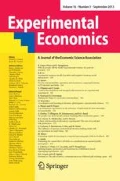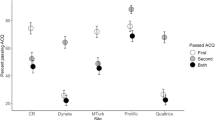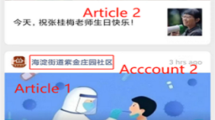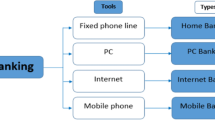Abstract
We conducted the first randomized controlled field experiment of an Internet reputation mechanism. A high-reputation, established eBay dealer sold matched pairs of lots—batches of vintage postcards—under his regular identity and under new seller identities (also operated by him). As predicted, the established identity fared better. The difference in buyers’ willingness-to-pay was 8.1% of the selling price. A subsidiary experiment followed the same format, but compared sales by relatively new sellers with and without negative feedback. Surprisingly, one or two negative feedbacks for our new sellers did not affect buyers’ willingness-to-pay.
Similar content being viewed by others
References
Akerlof, G. A. (1970). The Market for “Lemons”: Quality uncertainty and the market mechanism. The Quarterly Journal of Economics, 84(3), 488–500.
Avery, C., Resnick, P., & Zeckhauser, R. (1999). The Market for evaluations. American Economic Review, 89(3), 564–584.
Ba, S., & Pavlou, P. A. (2002). Evidence of the Effect of Trust Building Technology in Electronic Markets: Price Premiums and Buyer Behavior. MIS Quarterly, 26, 243–268.
Bajari, P., & Hortacsu, A. (2003). Winner’s curse, reserve prices and endogenous entry: Empirical insights from eBay auctions. RAND Journal of Economics, 34(2).
Bajari, P., & Hortacsu, A. (2004). Economic insights from internet auctions: A survey. Journal of Economic Literature, 42(2), 457–486.
Bolton, G., Fong, D., & Mosquin, P. (2003). Bayes factors with an application to experimental economics. Experimental Economics, 6(3).
Bolton, G., Katok, E., & Ockenfels, A. (2003). How effective are electronic reputation mechanisms? An experimental investigation. Available on-line at http://ockenfels.uni-koeln.de/download/papers/BKO2.pdf.
Cabral, L., & Hortacsu, A. (2004). The dynamics of seller reputation: Theory and evidence from eBay, NBER. Available on-line at http://www.nber.org/papers/w10363.
Camerer, C. (1998). Can asset markets be manipulated? A field experiment with racetrack betting. Journal of Political Economy, 106(3), 457–482.
Dewally, M., & Ederington, L. H. (2006). Reputation, certification, warranties, and information as remedies for seller-buyer information asymmetries: Lessons from the online comic book market. The Journal of Business, 79(2).
Dewan, S., & Hsu, V. (2004). Adverse selection in electronic markets: Evidence from online stamp auctions. Journal of Industrial Economics, 52(4), 497–516.
Diamond, D. W. (1989). Repuation acquisition in debt markets. Journal of Political Economy, 97(4), 828–862.
Eaton, D. H. (2002). Valuing information: Evidence from guitar auctions on eBay. Murray, KY, Murray State University: 28. Available on-line at http://campus.murraystate.edu/academic/faculty/david.eaton/workpaper0201.pdf.
Friedman, E., & Resnick, P. (2001). The social cost of cheap pseudonyms. Journal of Economics and Management Strategy, 10(2), 173–199.
Harrison, G. W., & List, J. A. (2004). Field experiments. Journal of Economic Literature, 42(4).
Henrich, B., Bowles, Camerer, Fehr, Gintis, & McElreath (2001). Cooperation, reciprocity and punishment in fifteen small-scale societies. American Economic Review, May 2001, 7.
Hossain, T., & Morgan, J. Plus shipping and handling: Revenue (Non) equivalence in field experiments on eBay. Advances in Economic Analysis and Policy, forthcoming.
Houser, D., & Wooders, J. (forthcoming). Reputation in auctions: Theory, and evidence from eBay. Journal of Economics and Management Strategy.
Jin, G., & Kato, A. (2004). Consumer frauds and the misinformed: Evidence from an online field experiment, University of Maryland. Available on-line at http://www.glue.umd.edu/~ginger/research/ebay-Jin-Kato-Feb04.pdf.
Kalyanam, K. & McIntyre, S. (2001). Return on reputation in online auction markets. Santa Clara, CA, Santa Clara University. Available on-line at http://business.scu.edu/faculty/research/working_papers/pdf/kalyanam_mcintyre_wp10.pdf.
Katkar, R., & Lucking-Reiley, D. (2000). Public versus secret reserve prices in eBay auctions: Results from a Pokémon field experiment. Available on-line at http://eller.arizona.edu/~reiley/papers/SecretReserves. pdf.
Keser, C. (2003). Experimental games for the design of reputation management systems. IBM Systems Journal, 42(3), 498–506.
List, J. A., & Lucking-Reiley, D. (2000). Demand Reduction in mulitunit auctions: Evidence from a sportscard field experiment. The American Economic Review, 90(4), 961–972.
List, J. A., & Lucking-Reiley, D. (2002). The effects of seed money and refunds on charitable giving: Experimental evidence from a university capital campaign. Journal of Political Economy, 110(8), 215–233.
Livingston, J. (2002). How valuable is a good reputation? A sample selection model of internet auctions, University of Maryland. Available on-line at http://www.wam.umd.edu/~kth/reputation1.pdf.
Lucking-Reiley, D. (1999). Using field experiments to test equivalence between auction formats: Magic on the internet. The American Economic Review, 1063–1080.
Lucking-Reiley, D., Bryan, D., Prasad, N., & Reeves, D. (2000). Pennies from eBay: the determinants of price in online auctions, vanderbilt. Available on-line at http://www.vanderbilt.edu/econ/reiley/papers/PenniesFromEBay.pdf.
McDonald, C. G., & Slawson Jr., V. C. (2002). Reputation in an internet auction market. Economic Inquiry, 40(4), 533–650.
Melnik, M. I., & Alm, J. (2002). Does a seller’s reputation matter? Evidence from eBay auctions. Journal of Industrial Economics, 50(September), 337–350.
Melnik, M. I., & Alm, J. (2003). Reputation, information signals, and willingness to pay for heterogeneous goods in online auctions. Available on-line at http://www.gsu.edu/~wwwsps/publications/2003/030101onlineauctions.htm.
Miller, N., Resnick, P., & Zeckhauser, R. (2005). Eliciting honest feedback in electronic markets. Management Science, 51(9), 1359–1373.
Reiley, D. (forthcoming). Field experiments on the effects of reserve prices in auctions: More magic on the internet. RAND Journal of Economics.
Resnick, P., & Zeckhauser, R. (2002). Trust among strangers in internet transactions: Empirical analysis of eBay’s reputation system. In M. R. Baye (ed.), The Economics of the Internet and E-Commerce. (pp. 127–157), Amsterdam, Elsevier Science. 11.
Results from a Pokeon Field Experiment. Available on-line at http://eller.arizona.edu/reiley/papers/SecretReserves.pdf
Schemo, D. J. (2004). In online auctions, misspelling in ads often spells cash. New York Times.
Shapiro, C. (1983). Premiums for high quality products as returns to reputations. Quarterly Journal of Economics, 98(4), 659–680.
Slonim, R., & Roth, A. (1998). Learning in high stakes ultimatum games: An experiment in the slovak republic. Econometrica, 66(3), 569–596.
Tversky, A., & Kahneman, D. (1974). Under uncertainty: Heuristics and biases. Science, 185, 1124–1131.
Yin, P.-L. (2002). Information dispersion and auction prices, stanford university. Available on-line at http://www.stanford.edu/~pyin/info.pdf.
Author information
Authors and Affiliations
Additional information
JEL Classification D82 · L14 · Z13
Rights and permissions
About this article
Cite this article
Resnick, P., Zeckhauser, R., Swanson, J. et al. The value of reputation on eBay: A controlled experiment. Exp Econ 9, 79–101 (2006). https://doi.org/10.1007/s10683-006-4309-2
Received:
Revised:
Accepted:
Issue Date:
DOI: https://doi.org/10.1007/s10683-006-4309-2




